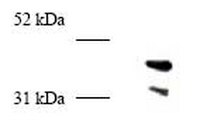PC474 Sigma-AldrichAnti-PCNA (247-261) (Ab-5) Rabbit pAb
This Anti-PCNA (247-261) (Ab-5) Rabbit pAb is validated for use in Immunoprecipitation for the detection of PCNA (247-261) (Ab-5).
More>> This Anti-PCNA (247-261) (Ab-5) Rabbit pAb is validated for use in Immunoprecipitation for the detection of PCNA (247-261) (Ab-5). Less<<Synonyms: Anti-Proliferating Cell Nuclear Antigen
Recommended Products
Overview
| Replacement Information |
|---|
Key Spec Table
| Species Reactivity | Host | Antibody Type |
|---|---|---|
| H | Rb | Polyclonal Antibody |
Pricing & Availability
| Catalogue Number | Availability | Packaging | Qty/Pack | Price | Quantity | |
|---|---|---|---|---|---|---|
| PC474-50ULCN |
|
Plastic ampoule | 50 ul |
|
— |
| Product Information | |
|---|---|
| Form | Liquid |
| Formulation | Undiluted serum. |
| Positive control | MCF7 cells |
| Preservative | ≤0.1% sodium azide |
| Quality Level | MQ100 |
| Biological Information | |
|---|---|
| Immunogen | a synthetic peptide corresponding to amino acids 247-261 of human PCNA |
| Immunogen | Human |
| Host | Rabbit |
| Isotype | IgG |
| Species Reactivity |
|
| Antibody Type | Polyclonal Antibody |
| Physicochemical Information |
|---|
| Dimensions |
|---|
| Materials Information |
|---|
| Toxicological Information |
|---|
| Safety Information according to GHS |
|---|
| Safety Information |
|---|
| Product Usage Statements |
|---|
| Packaging Information |
|---|
| Transport Information |
|---|
| Supplemental Information |
|---|
| Specifications |
|---|
| Global Trade Item Number | |
|---|---|
| Catalogue Number | GTIN |
| PC474-50ULCN | 04055977208337 |
Documentation
Anti-PCNA (247-261) (Ab-5) Rabbit pAb SDS
| Title |
|---|
Anti-PCNA (247-261) (Ab-5) Rabbit pAb Certificates of Analysis
| Title | Lot Number |
|---|---|
| PC474 |
References
| Reference overview |
|---|
| Miyachi, K., et al. 1990. J. Immunol. 121, 2228. Waseem, N.H. and Lane, D.P. 1990. Science 96, 121. Suzuka, I., et al. 1989. Proc. Natl. Acad. Sci. USA 86, 3189. Bravo, R., et al. 1987. Nature (London) 326, 515. Bravo, R. and MacDonald-Bravo, H. 1987. J. Cell. Biol. 105, 1549. |








